NUR2102 Assignment: Medication Management for Marcel's Case Study
VerifiedAdded on 2023/01/19
|7
|1494
|77
Report
AI Summary
This nursing assignment report analyzes the case of Marcel, a 70-year-old patient with hypoglycaemia and obesity, focusing on medication management through the application of the clinical reasoning cycle. The report identifies nursing priorities, including medication and self-management strategies, considering Marcel's high BMI, family history of diabetes, and lack of health literacy. It discusses interventions like metformin and glibenclamide, along with nutritional therapy and education to improve Marcel's health outcomes. The evaluation includes assessing blood glucose levels, weight reduction, and medication administration abilities. The conclusion emphasizes the importance of effective medication management, nutritional intake, and patient education for managing obesity and diabetes-related complications.
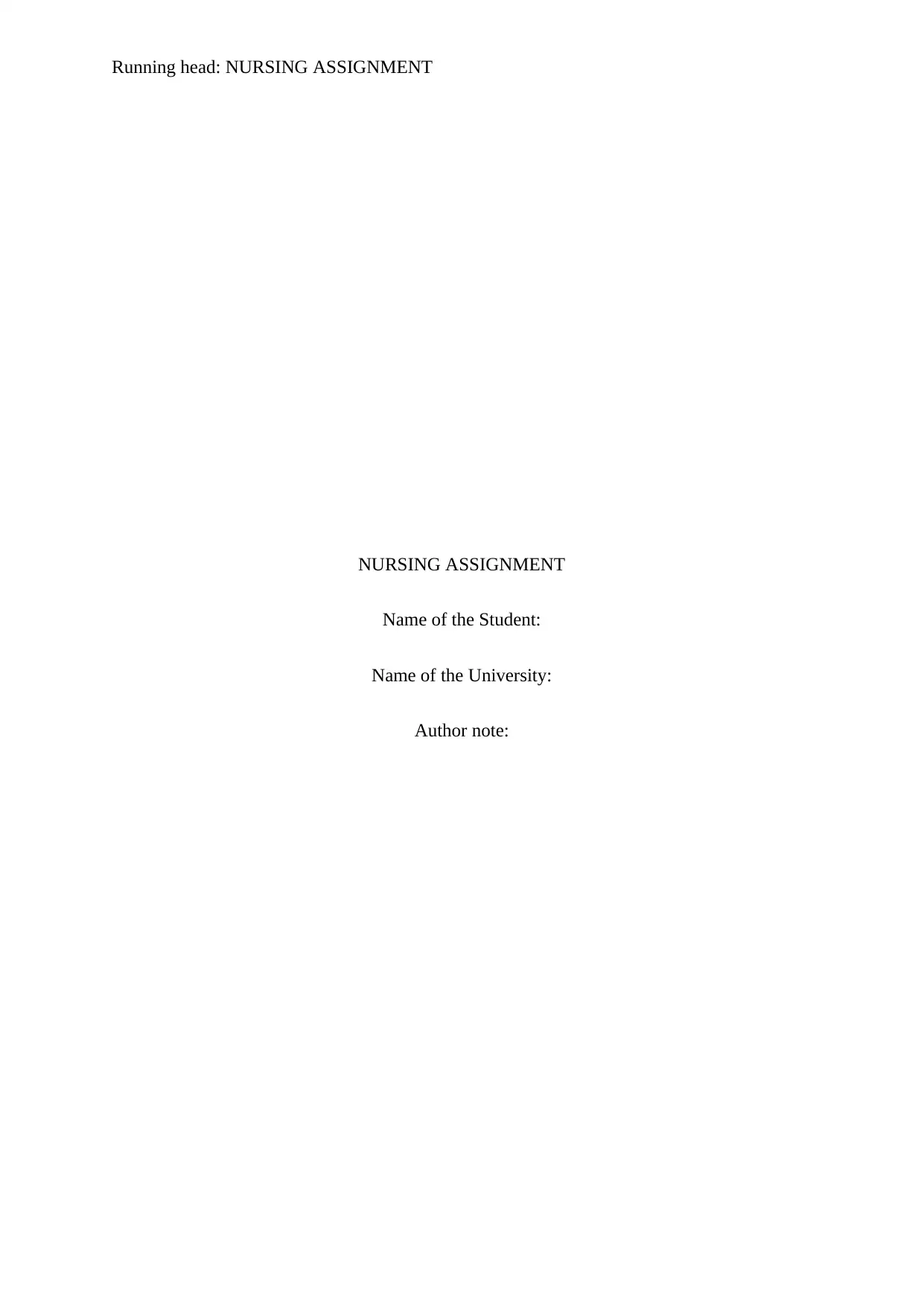
Running head: NURSING ASSIGNMENT
NURSING ASSIGNMENT
Name of the Student:
Name of the University:
Author note:
NURSING ASSIGNMENT
Name of the Student:
Name of the University:
Author note:
Paraphrase This Document
Need a fresh take? Get an instant paraphrase of this document with our AI Paraphraser
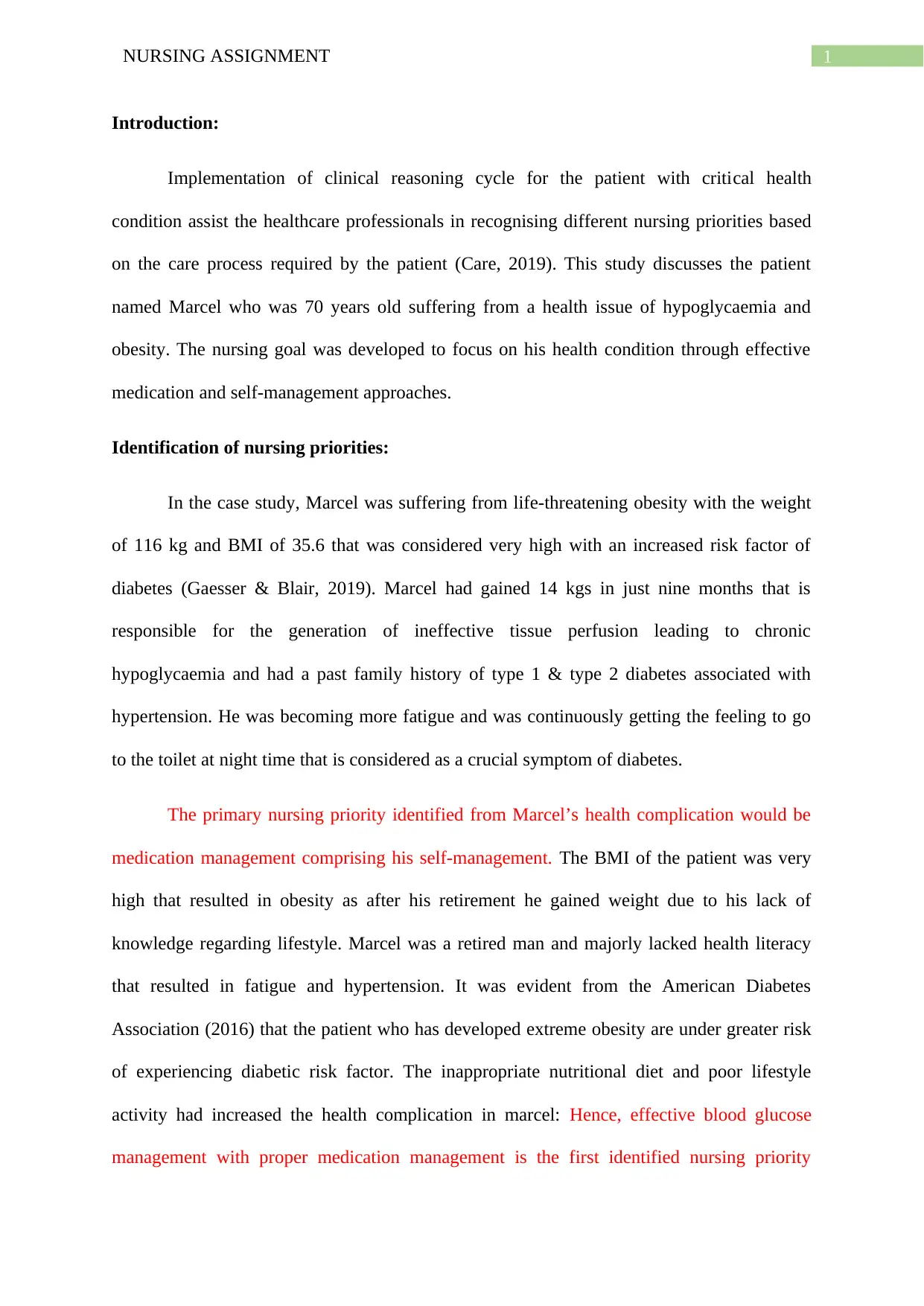
1NURSING ASSIGNMENT
Introduction:
Implementation of clinical reasoning cycle for the patient with critical health
condition assist the healthcare professionals in recognising different nursing priorities based
on the care process required by the patient (Care, 2019). This study discusses the patient
named Marcel who was 70 years old suffering from a health issue of hypoglycaemia and
obesity. The nursing goal was developed to focus on his health condition through effective
medication and self-management approaches.
Identification of nursing priorities:
In the case study, Marcel was suffering from life-threatening obesity with the weight
of 116 kg and BMI of 35.6 that was considered very high with an increased risk factor of
diabetes (Gaesser & Blair, 2019). Marcel had gained 14 kgs in just nine months that is
responsible for the generation of ineffective tissue perfusion leading to chronic
hypoglycaemia and had a past family history of type 1 & type 2 diabetes associated with
hypertension. He was becoming more fatigue and was continuously getting the feeling to go
to the toilet at night time that is considered as a crucial symptom of diabetes.
The primary nursing priority identified from Marcel’s health complication would be
medication management comprising his self-management. The BMI of the patient was very
high that resulted in obesity as after his retirement he gained weight due to his lack of
knowledge regarding lifestyle. Marcel was a retired man and majorly lacked health literacy
that resulted in fatigue and hypertension. It was evident from the American Diabetes
Association (2016) that the patient who has developed extreme obesity are under greater risk
of experiencing diabetic risk factor. The inappropriate nutritional diet and poor lifestyle
activity had increased the health complication in marcel: Hence, effective blood glucose
management with proper medication management is the first identified nursing priority
Introduction:
Implementation of clinical reasoning cycle for the patient with critical health
condition assist the healthcare professionals in recognising different nursing priorities based
on the care process required by the patient (Care, 2019). This study discusses the patient
named Marcel who was 70 years old suffering from a health issue of hypoglycaemia and
obesity. The nursing goal was developed to focus on his health condition through effective
medication and self-management approaches.
Identification of nursing priorities:
In the case study, Marcel was suffering from life-threatening obesity with the weight
of 116 kg and BMI of 35.6 that was considered very high with an increased risk factor of
diabetes (Gaesser & Blair, 2019). Marcel had gained 14 kgs in just nine months that is
responsible for the generation of ineffective tissue perfusion leading to chronic
hypoglycaemia and had a past family history of type 1 & type 2 diabetes associated with
hypertension. He was becoming more fatigue and was continuously getting the feeling to go
to the toilet at night time that is considered as a crucial symptom of diabetes.
The primary nursing priority identified from Marcel’s health complication would be
medication management comprising his self-management. The BMI of the patient was very
high that resulted in obesity as after his retirement he gained weight due to his lack of
knowledge regarding lifestyle. Marcel was a retired man and majorly lacked health literacy
that resulted in fatigue and hypertension. It was evident from the American Diabetes
Association (2016) that the patient who has developed extreme obesity are under greater risk
of experiencing diabetic risk factor. The inappropriate nutritional diet and poor lifestyle
activity had increased the health complication in marcel: Hence, effective blood glucose
management with proper medication management is the first identified nursing priority
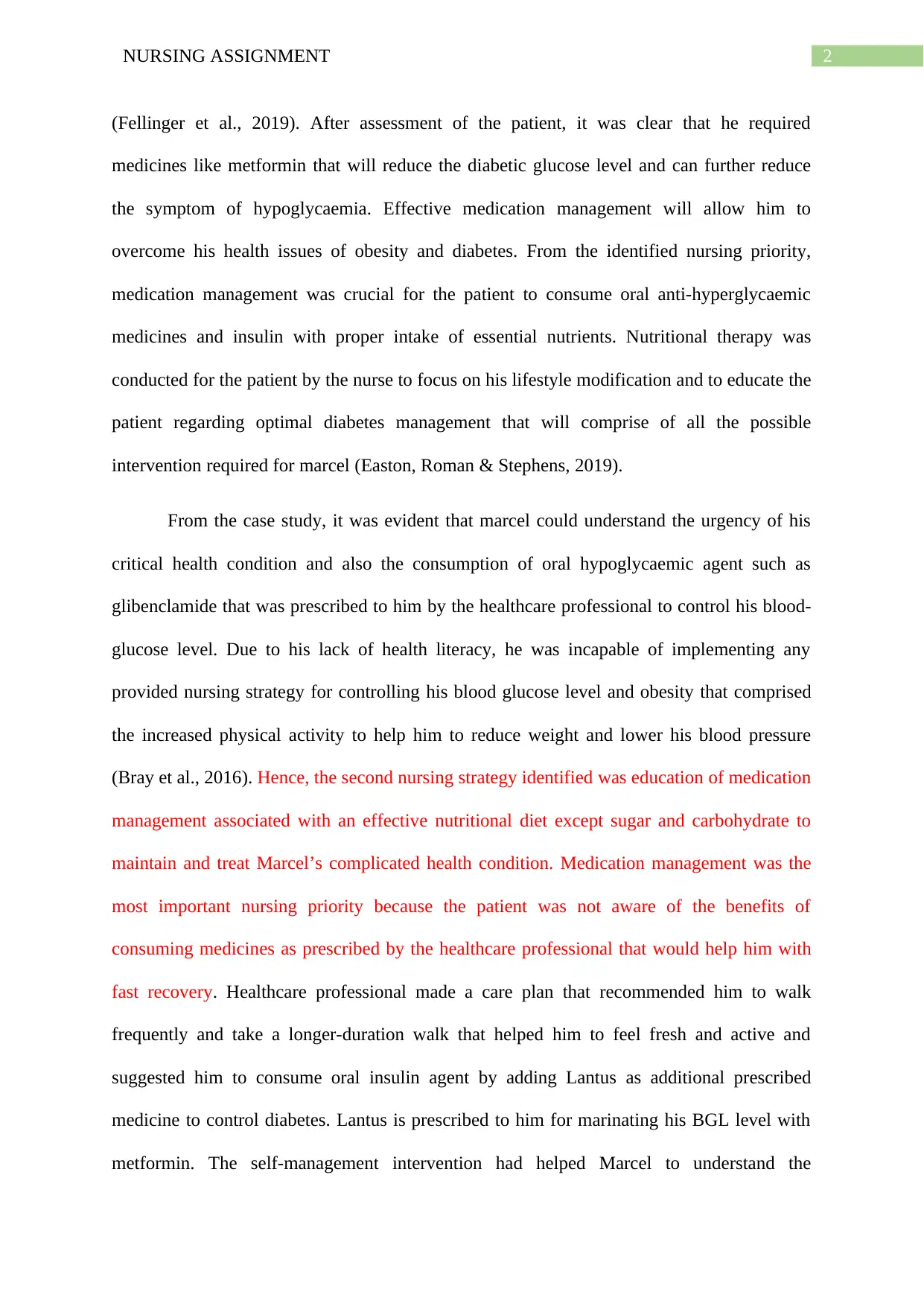
2NURSING ASSIGNMENT
(Fellinger et al., 2019). After assessment of the patient, it was clear that he required
medicines like metformin that will reduce the diabetic glucose level and can further reduce
the symptom of hypoglycaemia. Effective medication management will allow him to
overcome his health issues of obesity and diabetes. From the identified nursing priority,
medication management was crucial for the patient to consume oral anti-hyperglycaemic
medicines and insulin with proper intake of essential nutrients. Nutritional therapy was
conducted for the patient by the nurse to focus on his lifestyle modification and to educate the
patient regarding optimal diabetes management that will comprise of all the possible
intervention required for marcel (Easton, Roman & Stephens, 2019).
From the case study, it was evident that marcel could understand the urgency of his
critical health condition and also the consumption of oral hypoglycaemic agent such as
glibenclamide that was prescribed to him by the healthcare professional to control his blood-
glucose level. Due to his lack of health literacy, he was incapable of implementing any
provided nursing strategy for controlling his blood glucose level and obesity that comprised
the increased physical activity to help him to reduce weight and lower his blood pressure
(Bray et al., 2016). Hence, the second nursing strategy identified was education of medication
management associated with an effective nutritional diet except sugar and carbohydrate to
maintain and treat Marcel’s complicated health condition. Medication management was the
most important nursing priority because the patient was not aware of the benefits of
consuming medicines as prescribed by the healthcare professional that would help him with
fast recovery. Healthcare professional made a care plan that recommended him to walk
frequently and take a longer-duration walk that helped him to feel fresh and active and
suggested him to consume oral insulin agent by adding Lantus as additional prescribed
medicine to control diabetes. Lantus is prescribed to him for marinating his BGL level with
metformin. The self-management intervention had helped Marcel to understand the
(Fellinger et al., 2019). After assessment of the patient, it was clear that he required
medicines like metformin that will reduce the diabetic glucose level and can further reduce
the symptom of hypoglycaemia. Effective medication management will allow him to
overcome his health issues of obesity and diabetes. From the identified nursing priority,
medication management was crucial for the patient to consume oral anti-hyperglycaemic
medicines and insulin with proper intake of essential nutrients. Nutritional therapy was
conducted for the patient by the nurse to focus on his lifestyle modification and to educate the
patient regarding optimal diabetes management that will comprise of all the possible
intervention required for marcel (Easton, Roman & Stephens, 2019).
From the case study, it was evident that marcel could understand the urgency of his
critical health condition and also the consumption of oral hypoglycaemic agent such as
glibenclamide that was prescribed to him by the healthcare professional to control his blood-
glucose level. Due to his lack of health literacy, he was incapable of implementing any
provided nursing strategy for controlling his blood glucose level and obesity that comprised
the increased physical activity to help him to reduce weight and lower his blood pressure
(Bray et al., 2016). Hence, the second nursing strategy identified was education of medication
management associated with an effective nutritional diet except sugar and carbohydrate to
maintain and treat Marcel’s complicated health condition. Medication management was the
most important nursing priority because the patient was not aware of the benefits of
consuming medicines as prescribed by the healthcare professional that would help him with
fast recovery. Healthcare professional made a care plan that recommended him to walk
frequently and take a longer-duration walk that helped him to feel fresh and active and
suggested him to consume oral insulin agent by adding Lantus as additional prescribed
medicine to control diabetes. Lantus is prescribed to him for marinating his BGL level with
metformin. The self-management intervention had helped Marcel to understand the
⊘ This is a preview!⊘
Do you want full access?
Subscribe today to unlock all pages.

Trusted by 1+ million students worldwide
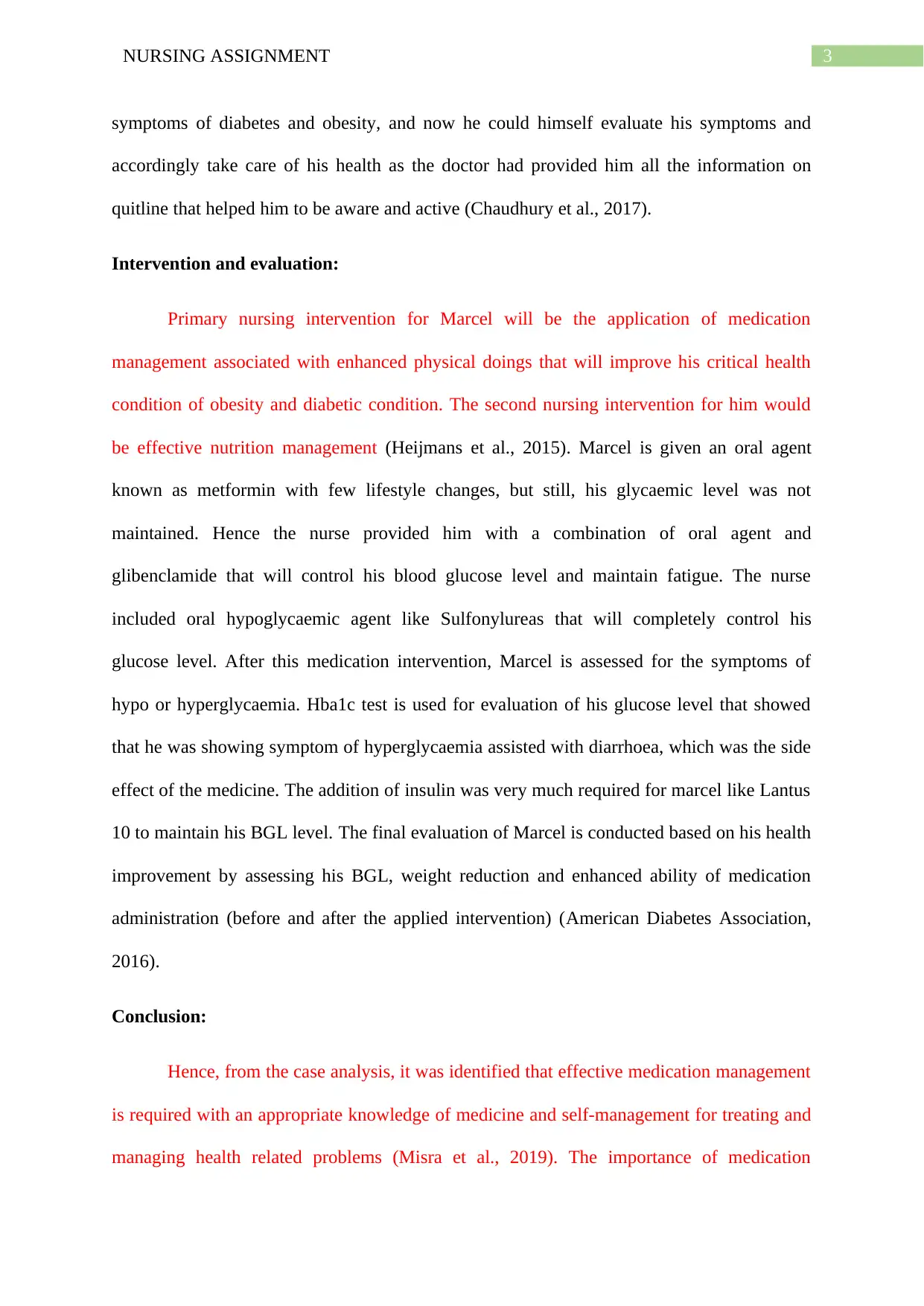
3NURSING ASSIGNMENT
symptoms of diabetes and obesity, and now he could himself evaluate his symptoms and
accordingly take care of his health as the doctor had provided him all the information on
quitline that helped him to be aware and active (Chaudhury et al., 2017).
Intervention and evaluation:
Primary nursing intervention for Marcel will be the application of medication
management associated with enhanced physical doings that will improve his critical health
condition of obesity and diabetic condition. The second nursing intervention for him would
be effective nutrition management (Heijmans et al., 2015). Marcel is given an oral agent
known as metformin with few lifestyle changes, but still, his glycaemic level was not
maintained. Hence the nurse provided him with a combination of oral agent and
glibenclamide that will control his blood glucose level and maintain fatigue. The nurse
included oral hypoglycaemic agent like Sulfonylureas that will completely control his
glucose level. After this medication intervention, Marcel is assessed for the symptoms of
hypo or hyperglycaemia. Hba1c test is used for evaluation of his glucose level that showed
that he was showing symptom of hyperglycaemia assisted with diarrhoea, which was the side
effect of the medicine. The addition of insulin was very much required for marcel like Lantus
10 to maintain his BGL level. The final evaluation of Marcel is conducted based on his health
improvement by assessing his BGL, weight reduction and enhanced ability of medication
administration (before and after the applied intervention) (American Diabetes Association,
2016).
Conclusion:
Hence, from the case analysis, it was identified that effective medication management
is required with an appropriate knowledge of medicine and self-management for treating and
managing health related problems (Misra et al., 2019). The importance of medication
symptoms of diabetes and obesity, and now he could himself evaluate his symptoms and
accordingly take care of his health as the doctor had provided him all the information on
quitline that helped him to be aware and active (Chaudhury et al., 2017).
Intervention and evaluation:
Primary nursing intervention for Marcel will be the application of medication
management associated with enhanced physical doings that will improve his critical health
condition of obesity and diabetic condition. The second nursing intervention for him would
be effective nutrition management (Heijmans et al., 2015). Marcel is given an oral agent
known as metformin with few lifestyle changes, but still, his glycaemic level was not
maintained. Hence the nurse provided him with a combination of oral agent and
glibenclamide that will control his blood glucose level and maintain fatigue. The nurse
included oral hypoglycaemic agent like Sulfonylureas that will completely control his
glucose level. After this medication intervention, Marcel is assessed for the symptoms of
hypo or hyperglycaemia. Hba1c test is used for evaluation of his glucose level that showed
that he was showing symptom of hyperglycaemia assisted with diarrhoea, which was the side
effect of the medicine. The addition of insulin was very much required for marcel like Lantus
10 to maintain his BGL level. The final evaluation of Marcel is conducted based on his health
improvement by assessing his BGL, weight reduction and enhanced ability of medication
administration (before and after the applied intervention) (American Diabetes Association,
2016).
Conclusion:
Hence, from the case analysis, it was identified that effective medication management
is required with an appropriate knowledge of medicine and self-management for treating and
managing health related problems (Misra et al., 2019). The importance of medication
Paraphrase This Document
Need a fresh take? Get an instant paraphrase of this document with our AI Paraphraser
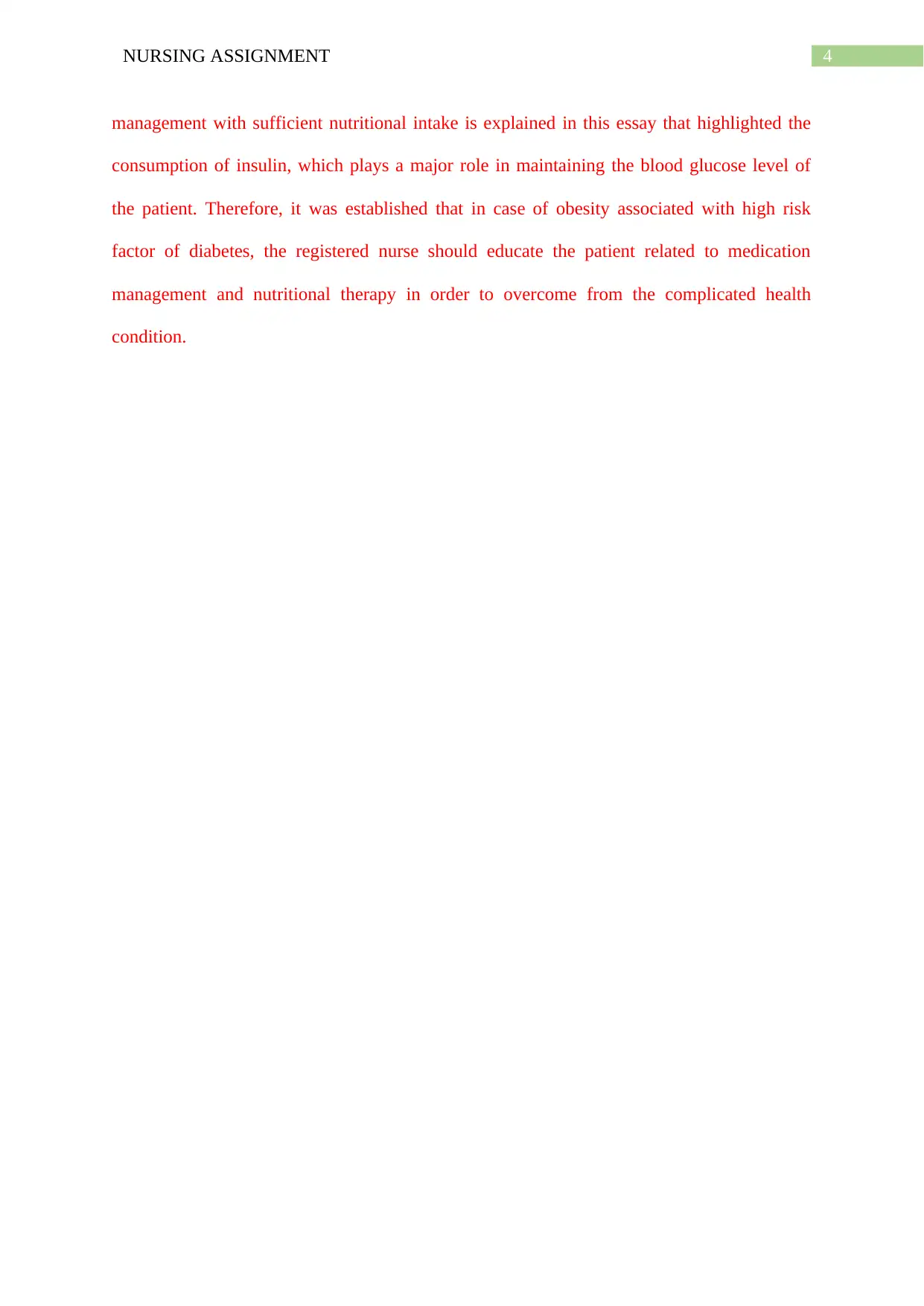
4NURSING ASSIGNMENT
management with sufficient nutritional intake is explained in this essay that highlighted the
consumption of insulin, which plays a major role in maintaining the blood glucose level of
the patient. Therefore, it was established that in case of obesity associated with high risk
factor of diabetes, the registered nurse should educate the patient related to medication
management and nutritional therapy in order to overcome from the complicated health
condition.
management with sufficient nutritional intake is explained in this essay that highlighted the
consumption of insulin, which plays a major role in maintaining the blood glucose level of
the patient. Therefore, it was established that in case of obesity associated with high risk
factor of diabetes, the registered nurse should educate the patient related to medication
management and nutritional therapy in order to overcome from the complicated health
condition.
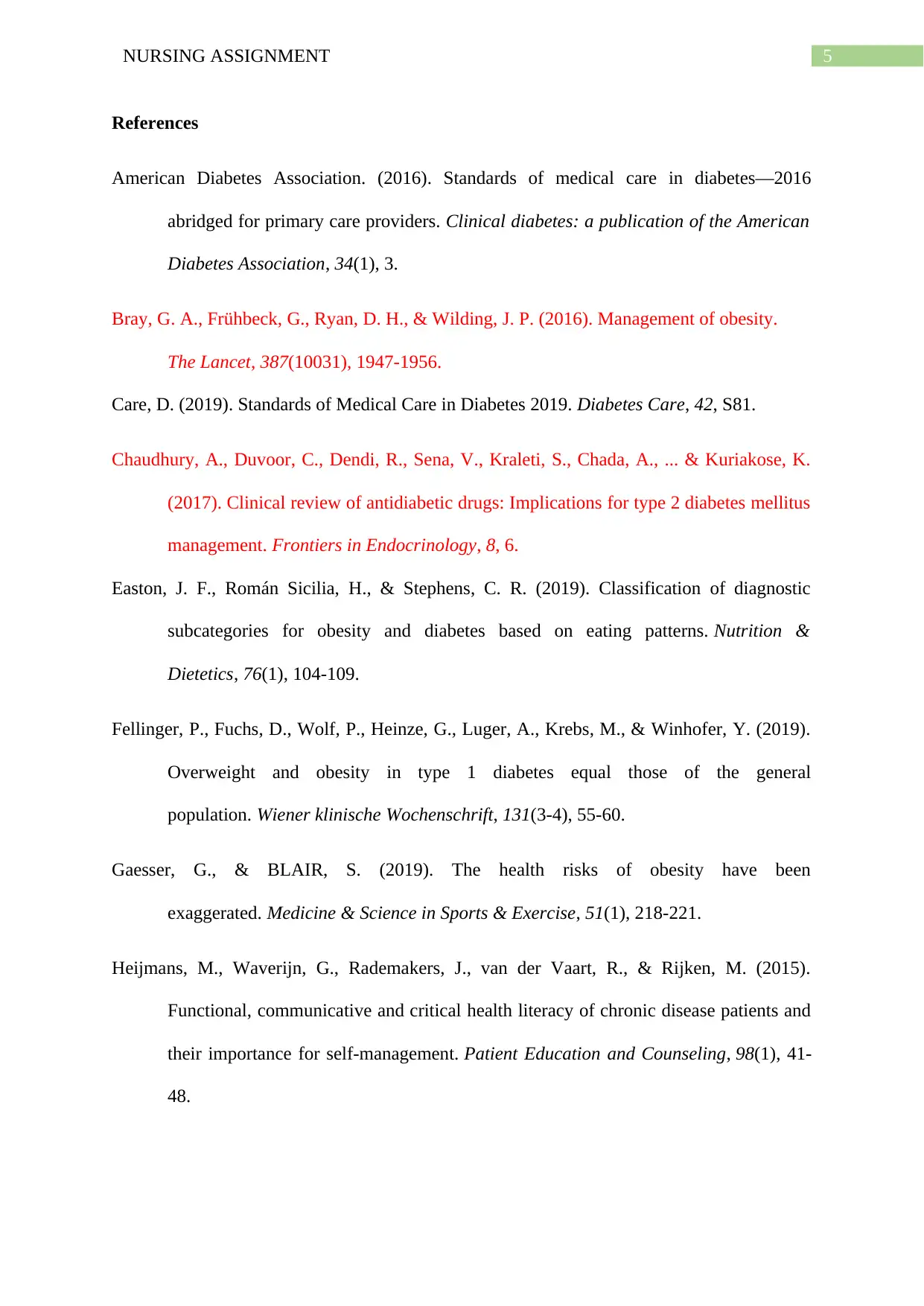
5NURSING ASSIGNMENT
References
American Diabetes Association. (2016). Standards of medical care in diabetes—2016
abridged for primary care providers. Clinical diabetes: a publication of the American
Diabetes Association, 34(1), 3.
Bray, G. A., Frühbeck, G., Ryan, D. H., & Wilding, J. P. (2016). Management of obesity.
The Lancet, 387(10031), 1947-1956.
Care, D. (2019). Standards of Medical Care in Diabetes 2019. Diabetes Care, 42, S81.
Chaudhury, A., Duvoor, C., Dendi, R., Sena, V., Kraleti, S., Chada, A., ... & Kuriakose, K.
(2017). Clinical review of antidiabetic drugs: Implications for type 2 diabetes mellitus
management. Frontiers in Endocrinology, 8, 6.
Easton, J. F., Román Sicilia, H., & Stephens, C. R. (2019). Classification of diagnostic
subcategories for obesity and diabetes based on eating patterns. Nutrition &
Dietetics, 76(1), 104-109.
Fellinger, P., Fuchs, D., Wolf, P., Heinze, G., Luger, A., Krebs, M., & Winhofer, Y. (2019).
Overweight and obesity in type 1 diabetes equal those of the general
population. Wiener klinische Wochenschrift, 131(3-4), 55-60.
Gaesser, G., & BLAIR, S. (2019). The health risks of obesity have been
exaggerated. Medicine & Science in Sports & Exercise, 51(1), 218-221.
Heijmans, M., Waverijn, G., Rademakers, J., van der Vaart, R., & Rijken, M. (2015).
Functional, communicative and critical health literacy of chronic disease patients and
their importance for self-management. Patient Education and Counseling, 98(1), 41-
48.
References
American Diabetes Association. (2016). Standards of medical care in diabetes—2016
abridged for primary care providers. Clinical diabetes: a publication of the American
Diabetes Association, 34(1), 3.
Bray, G. A., Frühbeck, G., Ryan, D. H., & Wilding, J. P. (2016). Management of obesity.
The Lancet, 387(10031), 1947-1956.
Care, D. (2019). Standards of Medical Care in Diabetes 2019. Diabetes Care, 42, S81.
Chaudhury, A., Duvoor, C., Dendi, R., Sena, V., Kraleti, S., Chada, A., ... & Kuriakose, K.
(2017). Clinical review of antidiabetic drugs: Implications for type 2 diabetes mellitus
management. Frontiers in Endocrinology, 8, 6.
Easton, J. F., Román Sicilia, H., & Stephens, C. R. (2019). Classification of diagnostic
subcategories for obesity and diabetes based on eating patterns. Nutrition &
Dietetics, 76(1), 104-109.
Fellinger, P., Fuchs, D., Wolf, P., Heinze, G., Luger, A., Krebs, M., & Winhofer, Y. (2019).
Overweight and obesity in type 1 diabetes equal those of the general
population. Wiener klinische Wochenschrift, 131(3-4), 55-60.
Gaesser, G., & BLAIR, S. (2019). The health risks of obesity have been
exaggerated. Medicine & Science in Sports & Exercise, 51(1), 218-221.
Heijmans, M., Waverijn, G., Rademakers, J., van der Vaart, R., & Rijken, M. (2015).
Functional, communicative and critical health literacy of chronic disease patients and
their importance for self-management. Patient Education and Counseling, 98(1), 41-
48.
⊘ This is a preview!⊘
Do you want full access?
Subscribe today to unlock all pages.

Trusted by 1+ million students worldwide
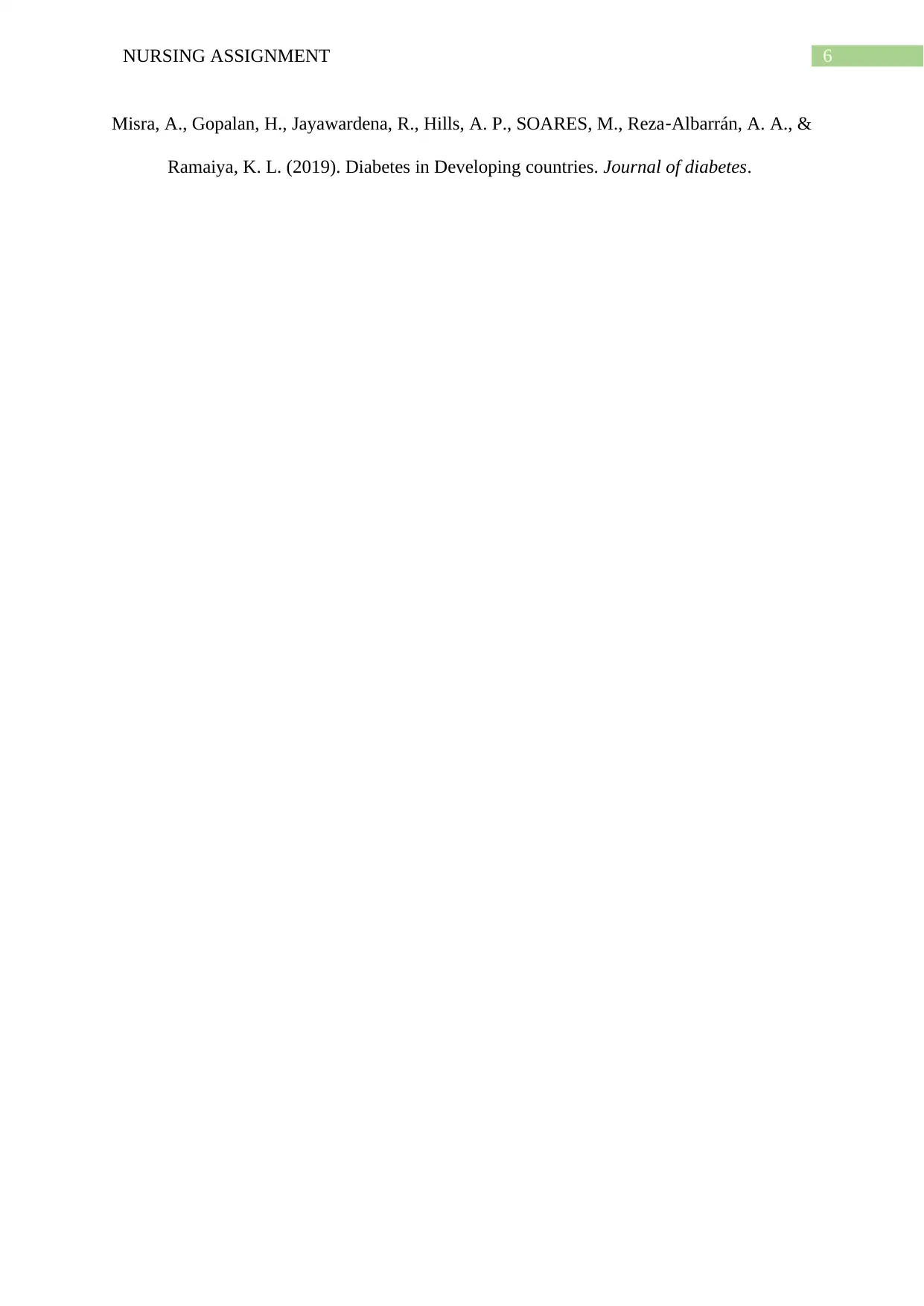
6NURSING ASSIGNMENT
Misra, A., Gopalan, H., Jayawardena, R., Hills, A. P., SOARES, M., Reza‐Albarrán, A. A., &
Ramaiya, K. L. (2019). Diabetes in Developing countries. Journal of diabetes.
Misra, A., Gopalan, H., Jayawardena, R., Hills, A. P., SOARES, M., Reza‐Albarrán, A. A., &
Ramaiya, K. L. (2019). Diabetes in Developing countries. Journal of diabetes.
1 out of 7
Related Documents
Your All-in-One AI-Powered Toolkit for Academic Success.
+13062052269
info@desklib.com
Available 24*7 on WhatsApp / Email
![[object Object]](/_next/static/media/star-bottom.7253800d.svg)
Unlock your academic potential
Copyright © 2020–2026 A2Z Services. All Rights Reserved. Developed and managed by ZUCOL.





